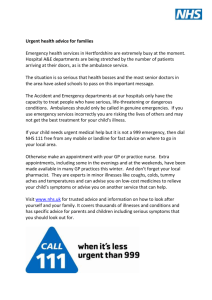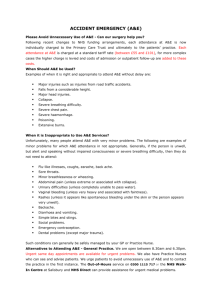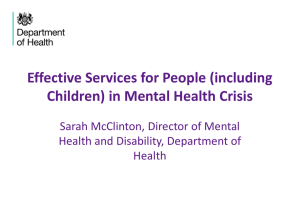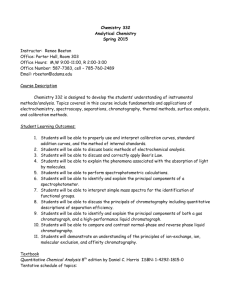the delegate pack - Mental Health Crisis Care Concordat
advertisement
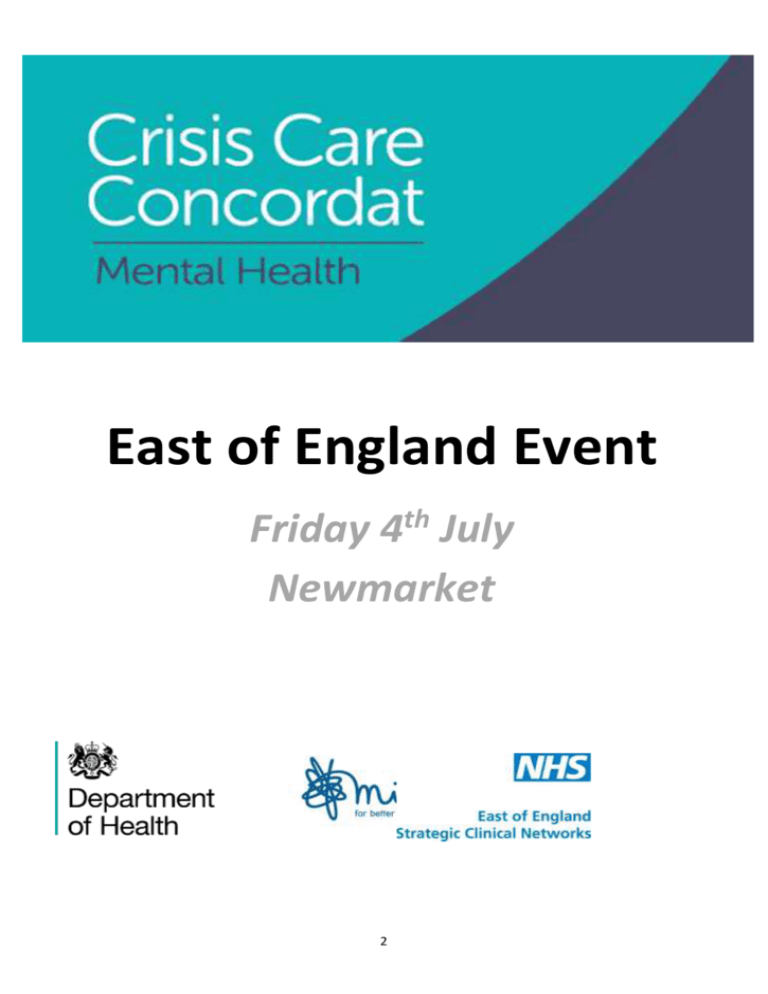
East of England Event Friday 4th July Newmarket 36 2 Message from the Chair, ‘I am delighted to introduce the urgent care concordat to our region. I hope that today we can facilitate a productive and useful discussion on how we can work with the concordat team regionally and locally to plan improvements for patients, families and carers over the next few years. The regions’ clinical commissioning groups and the wider communities in the East of England have shown a strong interest in increasing access and developing outcomes in this area, which is great need of improvement. I look forward to hearing people's views and am keen to find out how the East of England Strategic Clinical Network can help you take them forward.’ Dr Caroline Dollery Clinical Director, East of England Strategic Clinical Network for Mental Health, Dementia, Neurological Conditions, Learning Disability and Autism Page 2 of 25 Agenda 9.30am Coffee and Registration 10.00am Opening from Chair Caroline Dollery, Clinical Director of the East of England Strategic Clinical Network for Mental Health, Dementia, Neurological Conditions, Learning Disability and Autism 10.10am Video from Ministers Normal Lamb MP, Minister of State for Care and Support Rt Hon Damian Green MP, Minister of State for Policing, Criminal Justice and Victims 10.20am Speaker from the Department of Health Sarah McClinton, Director of Mental Health and Disability 10.35am An overview of the Crisis Care Concordat Jim Symington and Naomi Phillips followed by a Question and Answer session 10.55am The Social Care Perspective Pam Garraway, Corporate Director, Housing, Community Living and Adult Social Care, Luton Borough Council followed by a Question and Answer session 11.20am Refreshment Break 11.40am The North West London Urgent Care Programme Michael Doyle, Head of Urgent Care Programme 12.00pm The Policing Perspective Mark Smith, Head of Suicide Prevention and Mental Health, British Transport Police. Dr Dorothy Gregson, Chief Executive, Cambridgeshire Police and Crime Commissioner. 12.25pm Crisis Care and Emergency Medicine Matt Fossey, Senior Associate at the Centre for Mental Health. Dr Caroline Meiser-Stedman, Liaison Psychiatry Consultant, Addenbrookes Hospital. 12.50pm Question and Answer session for the speaker panel 13.00pm Lunch 13.45pm Strategic Clinical Network plenary and setting the afternoon task Led by the Caroline Dollery, Chair 14.05pm Facilitated table top work – progressing the local Declarations To include a feedback and sharing session 15.15pm Closing remarks and next steps Caroline Dollery, Chair Page 3 of 25 Session Hand-outs and Notes Opening from the Chair – Caroline Dollery Video from Ministers – Norman Lamb and Damian Green Page 4 of 25 Session Hand-outs and Notes Speaker from the Department of Health – Sarah McClinton An Overview of the Crisis Care Concordat – Jim Symington and Naomi Phillips Page 5 of 25 Session Hand-outs and Notes Local declarations - who needs to improve outcomes ? (Statutory responsibility or duty of care) Page 6 of 25 Session Hand-outs and Notes Support before crisis point Urgent and emergency access to crisis care Access to support before crisis point Tele triage and tele health Early Intervention Services Suicide prevention Quality of treatment and care when in crisis Urgent and emergency access to crisis care ‘Parity’ between responses to physical or Mental Health emergencies Single point of access to specialist mental health services Recovery and staying well / preventing future crises Quality of treatment and care when in crisis Physical assessment and treatment Mental state assessment Getting a life back Recovery and staying well / preventing future crises Crisis Plan (NICE) Safe, competent treatment at home wherever possible Self management and family involved crisis plan Timely ambulance transport to appropriate NHS Facility All utilities working, food in house, debts and benefits sorted Access to Liaison & Diversion from police custody or Court Transition to GP led care 24/7 Personalised care budget Crisis Home Treatment team Crisis and respite house Helplines Peer Support Help at Home Hospital Admission See Effective Bed Management Pathway Supported Housing Adult placement (with ‘fast track’ access back) Care and treatment (inc MHA, MCA,CPA) Page 7 of 25 Session Hand-outs and Notes The Social Care Perspective - Pam Garraway Page 8 of 25 Session Hand-outs and Notes Page 9 of 25 Session Hand-outs and Notes Page 10 of 25 Session Hand-outs and Notes The North West London Urgent Care Programme – Michael Doyle Page 11 of 25 Session Hand-outs and Notes NWL Mental Health Single Point of Access Page 12 of 25 Session Hand-outs and Notes Page 13 of 25 Session Hand-outs and Notes Page 14 of 25 Session Hand-outs and Notes The Policing Perspective – Mark Smith and Dr Dorothy Gregson Page 15 of 25 Session Hand-outs and Notes Suicides and Injurious Attempts – 2009 – 14 (1891 incidents in total) Page 16 of 25 Session Hand-outs and Notes Page 17 of 25 Session Hand-outs and Notes HOT SPOTS Page 18 of 25 Session Hand-outs and Notes Crisis Care and Emergency Medicine – Matt Fossey and Dr Caroline Meiser-Stedman Page 19 of 25 Session Hand-outs and Notes Strategic Clinical Network Plenary – Caroline Dollery Contact Details for the East of England Strategic Clinical Network for Mental Health, Dementia, Neurological Conditions, Learning Disability and Autism Caroline Dollery Clinical Director cdollery@nhs.net Mary Emurla Network Manager m.emurla@nhs.net Helen Hardy Sally Donaghey Clinical Commissioning Lead Consultant & Leadership Programme Manager Quality Improvement Lead, Dementia, Learning Disability & Autism helen.hardy7@nhs.net sally.donaghey@nhs.net Sam Lane Quality Improvement Lead, Mental Health sam.lane1@nhs.net Victoria Doyle Quality Improvement Lead, Neurological Conditions victoria.doyle@nhs.net Gemma Emsden Network Senior Administrator gemma.emsden@nhs.net General enquiries england.eoescn-mhdnl@nhs.net / 0113 825 4949 Page 20 of 25 Session Hand-outs and Notes Workshop – Progressing the local declarations 1. What work has been done in your area so far? What progress has been made on the declarations and action plans? Are all the key concordat signatories involved? (If not, who is missing?) 2a. What are the next steps? 2b. What support do you need/want to take these steps effectively? Both from each other and from the Strategic Clinical Network Page 21 of 25 The Mental Health Crisis Care Concordat An Overview The Mental Health Crisis Care Concordat is a national agreement between services and agencies involved in the care and support of people in crisis. It sets out how organisations will work together better to make sure that people get the help they need when they are having a mental health crisis. The Crisis Care Concordat challenges local areas to make sure that: Health-based places of safety and beds are available 24/7 in case someone experiences a mental health crisis Police custody should not be used because mental health services are not available and police vehicles should also not be used to transfer patients. We want to see the number of occasions police cells are used as a place of safety for people in mental health crisis halved compared 2011/12 Timescales are put in place so police responding to mental health crisis know how long they have to wait for a response from health and social care workers. This will make sure patients get suitable care as soon as possible. People in crisis should expect that services will share essential ‘need to know’ information about them so they can receive the best care possible. This may include any history of physical violence, self-harm or drink or drug history Figures suggest some black and minority ethnic groups are detained more frequently under the Mental Health Act. Where this is the case, it must be addressed by local services working with local communities so that the standards set out in the Concordat are met. A 24-hour helpline should be available for people with mental health problems and the crisis resolution team should be accessible 24 hours a day, 7 days a week This statement was made and agreed by: • Association of Ambulance Chief Executives • Association of Chief Police Officers • Association of Directors of Adult Social Services • Association of Directors of Children’s Services • Association of Police and Crime Commissioners • British Transport Police • Care Quality Commission • College of Emergency Medicine • College of Policing • The College of Social Work • Department of Health • Health Education England • • • • • • • • • Home Office Local Government Association Mind NHS Confederation NHS England Public Health England Royal College of General Practitioners Royal College of Nursing Royal College of Pediatrics and Child Health • Royal College of Psychiatrists Third sector and charity supporters of the Concordat are: • Centre for Mental Health • Mental Health Foundation • Mental Health Providers Forum • National MIND • National Survivor User Network • Rethink Mental Illness • Stonewall • Turning Point Page 22 of 25 • Young Minds What people who use crisis services expect from the Concordat the Core Principles and Outcomes Access to support before crisis point Making sure people with mental health problems can get help 24 hours a day and that when they ask for help, they are taken seriously. “When I need urgent help to avert a crisis I, and people close to me, know who to contact at any time, 24 hours a day, seven days a week. People take me seriously and trust my judgement when I say I am close to crisis, and I get fast access to people who help me get better.” Urgent and emergency access to crisis care Making sure that a mental health crisis is treated with the same urgency as a physical health emergency. “If I need emergency help for my mental health, this is treated with as much urgency and respect as if it were a physical health emergency. If the problems cannot be resolved where I am, I am supported to travel safely, in suitable transport, to where the right help is available.” “I am seen by a mental health professional quickly. If I have to wait, it is in a place where I feel safe. I then get the right service for my needs, quickly and easily.” “Every effort is made to understand and communicate with me. Staff check any relevant information that services have about me and, as far as possible, they follow my wishes and any plan that I have voluntarily agreed to.” “I feel safe and am treated kindly, with respect, and in accordance with my legal rights.” “If I have to be held physically (restrained), this is done safely, supportively and lawfully, by people who understand I am ill and know what they are doing.” “Those closest to me are informed about my whereabouts and anyone at school, college or work who needs to know is told that I am ill. I am able to see or talk to friends, family or other people who are important to me if I so wish. I am confident that timely arrangements are made to look after any people or animals that depend on me.” Quality of treatment and care when in crisis Making sure that people are treated with dignity and respect, in a therapeutic environment. “I am treated with respect and care at all times.” “I get support and treatment from people who have the right skills and who focus on my recovery, in a setting which suits me and my needs. I see the same staff members as far as possible, and if I need another service this is arranged without unnecessary assessments. If I need longer term support this is arranged.” “I have support to speak for myself and make decisions about my treatment and care. My rights are clearly explained to me and I am able to have an advocate or support from family and friends if I so wish. If I do not have capacity to make decisions about my treatment and care, any wishes or preferences I express will be respected and any advance statements or decisions that I have Page 23 of 25 made are checked and respected. If my expressed wishes or previously agreed plan are not followed, the reasons for this are clearly explained to me.” Recovery and staying well Preventing future crises by making sure people are referred to appropriate services. “I am given information about, and referrals to, services that will support my process of recovery and help me to stay well.” “I, and people close to me, have an opportunity to reflect on the crisis, and to find better ways to manage my mental health in the future, that take account of other support I may need, around substance misuse or housing for example. I am supported to develop a plan for how I wish to be treated if I experience a crisis in the future and there is an agreed strategy for how this will be carried out.” “I am offered an opportunity to feed back to services my views on my crisis experience, to help improve services for myself and others. Page 24 of 25 Page 25 of 25

